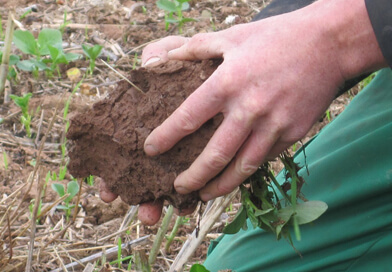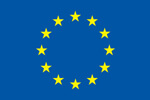Find out more about the overall project on the SmartSoil website
View project on the EU CORDIS website
Papers published:
- Ingram, J., Mills, J., Dibari, C., Ferrise, R., Ghaley, B.B., Hansen, J.G., Iglesias, A., Karaczun , Z., McVittie , A., Merante, P., Molnar, A. and Sánchez, B. (2016) ‘Communicating soil carbon science to farmers: incorporating credibility, salience and legitimacy’. Journal of Rural Studies 48 , 115-128. Access paper online.
- Ingram, J., Mills, J., Frelih-Larsen, A., Davis, M., Merante, P., Ringrose, S., Molnar, A., Sánchez, B., Bahadur Ghaley, B.and Karaczun, Z. (2014) ‘Managing Soil Organic Carbon: A Farm Perspective’ Eurochoices Volume 13, Issue 2, pages 12–19, August. Access paper online.
- Making the most of soil carbon – tools for farmers, advisers and policy makers – Read Press Release 05/11/2015
Project Summary


SmartSOIL was funded by the Seventh Framework Programme of the European Community and involves twelve partner organisations from Denmark, Italy, The Netherlands, Spain, France, Germany, Poland, Belgium Hungary and the UK. The CCRI took a key role leading one of the Work Packages. The CCRI staff members involved were Julie Ingram and Jane Mills, and the project commenced in June 2011 and ended in September 2015.
The overarching aim of SmartSOIL was to contribute to reversing the current degradation trend of European agricultural soils by improving soil carbon management in soils of arable and mixed farming systems covering intensive to low-input and organic farming systems. This entailed two overall aims: • the application of a holistic approach to identify farming systems and agronomic practices that result in an optimised balance between crop productivity, restoration and maintenance of vital soil functions (fertility, biodiversity, water, nutrients cycling and other soil ecosystem services) and soil carbon sequestration and storage; • development and delivery of the SmartSOIL decision support tool and guidelines to support novel approaches, techniques, and technologies adapted to different European soils and categories of beneficiaries (farmers, farm advisory and extension services, and policy makers).
The project involved twelve partner organisations from Denmark, Italy, The Netherlands, Spain, France, Germany, Poland, Belgium Hungary and the UK.
It came to a close at a conference held in Brussels on 30 September 2015, attended by both Dr Julie Ingram and Jane Mills. Around 100 participants representing policy-makers, farmer unions and advisory organisations, researchers, NGOs, Member States and regional authorities, researchers and farmers attended the day-long event.


The conference presented the results of the SmartSOIL project and offered a forum to discuss the implications and opportunities for policy and practitioners. Julie Ingram introduced the approach taken to developing the main output of the project, the SmartSOIL decision support toolbox, which aims to help advisers, farmers and policy-makers identify cost effective management options to optimise crop yields and soil carbon for particular farming systems, soils and climates.
Jørgen E. Olesen, the project co-ordinator, from Aarhus University introduced 7 key principles of effective soil organic carbon management and highlighted the key messages on the impact of soil management practices on crop productivity, soil organic C stocks and other ecosystem services.
The afternoon sessions considered the economic benefits for farmers of soil carbon management followed by a participatory discussion on SmartSOIL policy recommendations, including innovative approaches and policy options for promoting beneficial management practices.
A major output of the project was an innovative ‘Toolbox’, aimed to help farmers achieve a good balance between crop productivity, soil health and soil carbon storage.
The Toolbox includes:
- The SmartSOIL Tool, a Decision Support Tool which allows farmers and advisers to experiment virtually to see the effect of changes in practice on their yields and soil carbon
- FactSheets summarising benefits, costs and experiences associated with the different management practices which increase or sustain soil carbon (cover crops, residue management, conservation agriculture, adding manures, crop rotations)
- Real Life Cases from selected farmers in six different European countries showing the benefits, drawbacks and costs of implementing these practices
- Videos demonstrating the application of different management practices on farm
- Policy options to promote beneficial management practices at national and EU level
- Maps for policy makers and scientists which indicate areas at risk of losing soil organic carbon, and current carbon stocks in the EU
The Toolbox can be found at http://smartsoil.eu/smartsoil-toolbox/about/ and will be available in English, Danish, German, Spanish, Italian, Hungarian and Polish.
Updates
- Making the most of soil carbon – tools for farmers, advisers and policy makers – Press Release 05/11/2015
- Article in Agra Europe
- Read the SmartSoil Newsletter (February 2015)
Report published:
Ingram, J., Mills, J., Frelih-Larsen, A. and Davis, M. (2012) Uptake of soil management practices and experiences with decisions support tools: Analysis of the consultation with the farming community. Deliverable 5.1 for EU SmartSoil project. More information and final report.
An article entitled ‘Managing Soil Organic Carbon: A Farm Perspective’ co-authored by Julie and Jane, in connection with this project was published in the journal Eurochoices (Volume 13, Issue 2, pages 12–19, August 2014). The full authors of the article were Julie Ingram, Jane Mills, Ana Frelih-Larsen, McKenna Davis, Paulo Merante, Sian Ringrose, Andras Molnar, Berta Sánchez, Bhim Bahadur Ghaley and Zbigniew Karaczun.
A second report from this project Overview of socio-economic influences on crop and soil management systems was published in April 2014. This report examines results from Stakeholder Workshops undertaken in six case study regions across Europe looking at:
- Typical cropping systems and rotations and the associated risks to soil carbon and implementation of soil carbon management practices
- The barriers and the opportunities to implementation of cost effective soil carbon management practices
Workshops were held in Zealand, Denmark; Central Region, Hungary; Tuscany Region, Italy; Mazovia, Poland; East Coast, Scotland; and Andalucía, Spain. Participants included: agricultural advisors (from public extension and commercial services), farmer representatives, leading farmers and policy makers.


This project has received funding from the European Union’s Seventh Framework Programme for research, technological development and demonstration under grant agreement no 289694.




